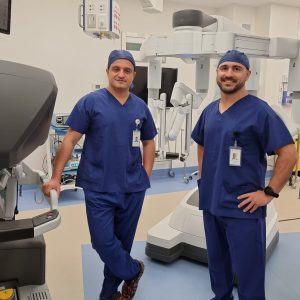Extracorporeal Shock Wave Lithotripsy
Also sometimes referred to as kidney stone shockwave treatment, extracorporeal shock wave lithotripsy is a non-invasive therapy for the treatment of kidney stones that has been used reliably since the 1980s. A specialised piece of medical equipment, known as a lithotripter, is used to generate high frequency shock waves. With the guidance of an ultrasound probe, these shock waves are then directed into the body, at the kidney stones. The shock waves work to break the kidney stones up into smaller fragments, which can then be passed through the urine.
What are kidney stones?
Kidney stones are also known as renal calculi, and are basically hard deposits that form inside the urinary tract when calcium and other minerals clump together. Stones commonly form inside the kidney, but they can often move into the ureter, where they can cause urinary symptoms, usually leading to their discovery.
In many instances, kidney stones pass on their own. However in cases of larger stones, they can become lodged in parts of the urinary tract, causing a blockage that leads to pain, and in some cases infection. Other symptoms commonly caused by kidney stones include blood in the urine, flank pain, and fever.
Extracorporeal shock wave lithotripsy treatment for kidney stones
Kidney stones that cause the patient pain or other health problems need to be treated. Extra corporeal shock wave lithotripsy may be recommended by your urologist, if it is an appropriate treatment for your individual circumstances. There are also a variety of other medical and surgical treatments available for patients where extracorporeal shock wave lithotripsy is not the preferred option.
Melbourne Urology Centre’s experienced urological surgeons perform extracorporeal shock wave lithotripsy in Melbourne. This treatment is most suitable for patients that have stones less than 1.5cm in diameter. For larger stones, extracorporeal shock wave lithotripsy may not be as effective.
Extracorporeal shock wave lithotripsy is most effective when the stones are located within the kidney, or within the ureter close to the kidney.
Your urological surgeon will be able to determine your suitability for extracorporeal shock wave lithotripsy. This is dependent on a number of factors, including:
- Size and shape of the stone that needs to be treated
- Location of the stone within the urinary tract
- General, overall health of the patient
- The health of the patient’s kidney(s).
Are there advantages to having extracorporeal shock wave lithotripsy to treat kidney stones?
The main advantage of extracorporeal shockwave lithotripsy is that it is a non-invasive procedure. This mean that there are no incisions involved, so the patient does not require a hospital stay. Most patients are able to resume their normal daily activities within 1-2 days of having their treatment.
What can patients expect during and after having extracorporeal shock wave lithotripsy treatment?
Extracorporeal shock wave lithotripsy is performed under anaesthetic or sedation. Despite that there are no incisions involved, there may be some discomfort associated with the procedure; anaesthetic helps to keep the patient comfortable and still throughout the procedure.
During the extracorporeal shock wave lithotripsy treatment, the patient is positioned on the operating table in a position that allows the surgeon to access to the kidney stone location. An ultrasound or xray is then used to pinpoint the precise location of the stone(s). The specialised lithotripter probe accurately directs the shock waves to the location of the stone, where they are required.
Extracorporeal shockwave lithotripsy generally requires between 1000-2000 shockwaves to effectively treat a kidney stone, and the procedure usually takes 45-60 minutes to complete.
After having extracorporeal shock wave lithotripsy treatment, patients can expect to pass small fragments of stone in their urine for the next few days. Sometimes these are visible, but most ‘stone dust’ passes undetected. On occasion, stone fragments can cause some discomfort as they pass. Sometimes patients experience some abdominal discomfort, which can be associated with passing the stones, depending on where in the urinary tract the stones were located. This discomfort is usually felt as a dull ache and is expected to subside over the coming few days.
Patients who have had extracorporeal shockwave lithotripsy should aim to drink plenty of water following their procedure. This help to maintain hydration, flush stone fragments from the urinary tract, and assists in the prevention of future stone formation.
In some cases, repeat treatments of extracorporeal shock wave lithotripsy may be required to break up fragments further. This depends on the size, location and number of stones present. Your urologist will advise you if this is the case for your condition.
Where does Melbourne Urology Centre perform extracorporeal shockwave lithotripsy treatment in Melbourne?
For patients in Melbourne extracorporeal shock wave lithotripsy treatment is performed by our urologists at a number of private hospitals throughout Victoria.

Extracorporeal shock wave lithotripsy Melbourne patients can visit St John of God Berwick Hospital, Mulgrave Private Hospital, Beleura Private Hospital, as well as a number of other locations.
